Does Your Child’s Spelling List Make Sense?
Spelling lists are the foundation of many spelling programs. But when you take a closer look, you’ll see that most spelling lists don’t make sense to the student. In fact, most lists have major flaws that actually keep kids from learning to spell.
In this blog post, we’ll take a look at some common types of ineffective spelling lists. After you know what to look for, you’ll be able to spot the ineffective lists and prevent frustration for your student. And you’ll save yourself a lot of grief, too!
Common Types of Ineffective Spelling Lists
Words taken from a book the student is reading
The words on these lists are usually unrelated both in terms of content and phonetic structure. For example, this 3rd-grade spelling list from Trumpet of the Swan includes words such as catastrophe, reveille, and plumage.
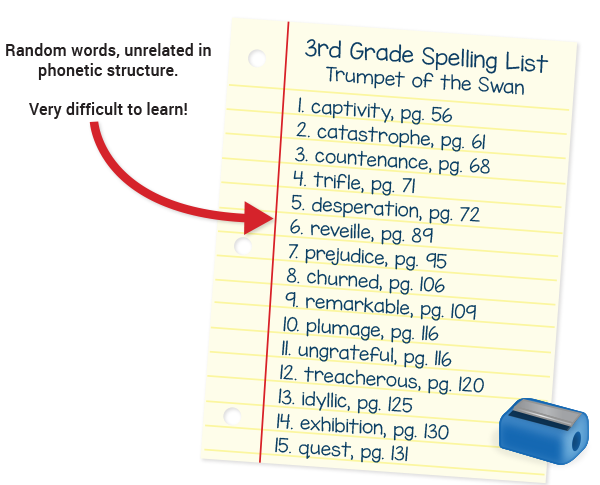
Words showing all the different ways that a single sound can be spelled
These lists can contain words with as many as six or seven different ways to spell the same sound. For example, the following list features the long I sound and includes words such as item, timed, pie, cry, light, and kindness.
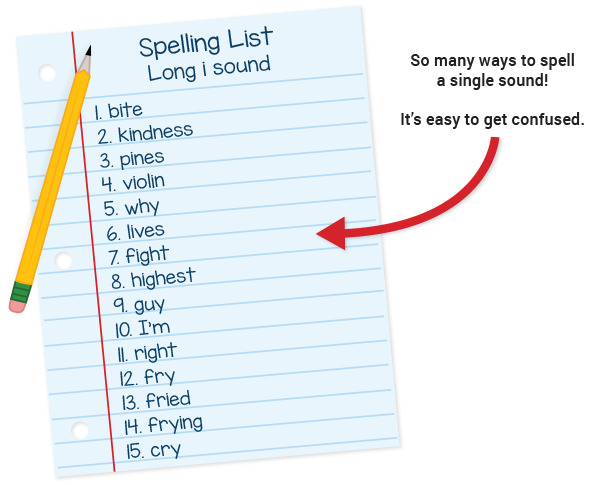
Words taken from the Dolch or Fry lists (in frequency order)
The words on this type of spelling list are completely unrelated to each other. Seemingly random words such as hot, because, far, live, and draw, are grouped together only because they are frequently used words.
Words centered around a theme
One week the spelling list might be geography-themed and include the words longitude, Britain, and region. The next week the word list might focus on math and feature words like quotient, addition, and prime. These are all good words, but unfortunately kids are expected to memorize the spellings by rote instead of learning why the words are spelled the way they are.
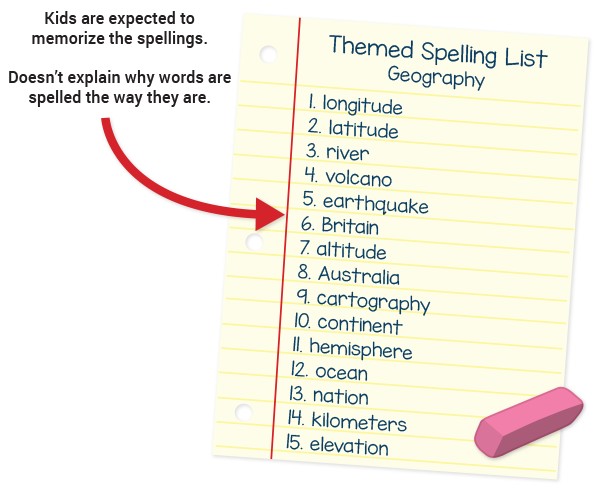
Here’s the Main Problem with These Lists
All these lists make spelling much harder than it needs to be. The related phonograms and spelling rules generally aren’t explicitly or systematically taught, leaving students to figure out the code on their own or resort to guessing. Rote memorization of the words on the list is difficult (and boring). And the words are easily forgotten because there is nothing for the learner’s mind to “attach” the words to.
For many students, learning to spell with ineffective lists leads to a lifetime of poor spelling. But there’s a better way!
Spelling Lists that Do Make Sense
Here’s the good news! There is a fifth type of list that actually does make sense.
Word lists centered on a single, well-organized spelling concept
This is the type of list we use in the All About Spelling program.
Our lists are different. We don’t just hand the student a list on Monday and expect him to have it memorized for a test on Friday. In fact, we don’t even have tests! Instead, we teach students why words are spelled the way they are and demonstrate how all the words on the list are related to each other.
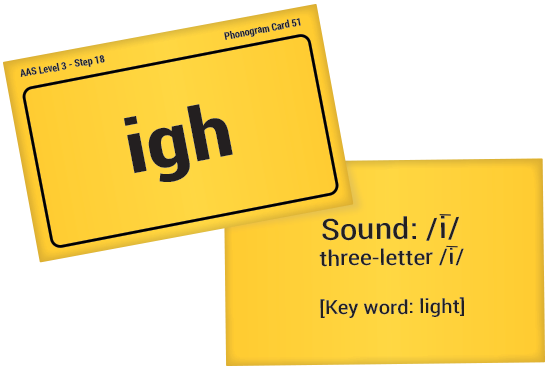
For example, when we teach the IGH phonogram (which says /ī/ as in high), we teach multiple words that contain IGH, such as:

Can you see how the words on this list reinforce the phonogram the child has learned and provides the opportunity to practice it?
Unlike the Long I list shown in list type #2, our list has reason and logic behind it and will therefore be easy for a student to remember and use for encoding new words later on.
An Emphasis on Review
After the student learns the words that contain the IGH phonogram, we review that newly learned concept in many ways.
In all, we incorporate four major spelling strategies (phonetic, rule-based, visual, and morphemic), as well as five minor strategies. Check out this article on effective spelling strategies to learn more.
We do whatever it takes to make learning stick, which is the exact opposite of what happens with the “list on Monday, test on Friday” approach.
When you use spelling lists that make sense, it’s a win-win. Your child gets the type of teaching he deserves, and you get the satisfaction of watching him become a happy, successful speller.
Has your child ever been given a spelling list that didn’t make sense? Please share in the comments below.
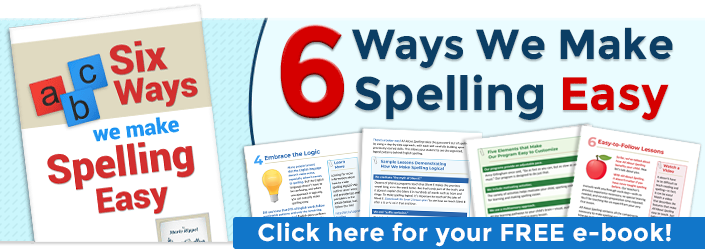




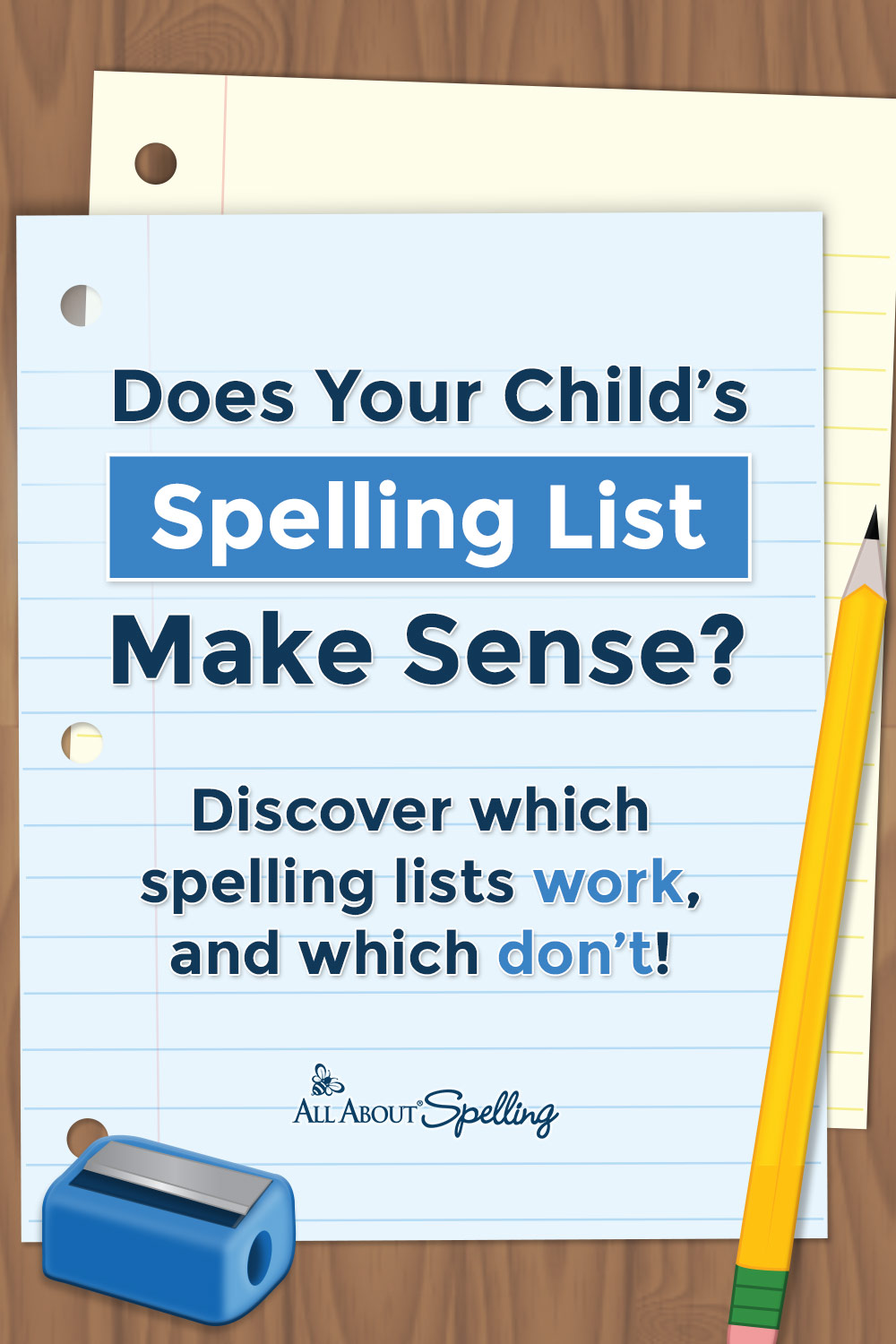






Shari
says:Thanks for sharing this material! It will be useful this school year.
Robin
says: Customer ServiceGlad this will be useful, Shari! You’re welcome.
Ms. Joy
says:Yes! I tried to work through a list of spelling words in a curriculum and was confused as to why the list combined short i and short a in the same list. I lamented to my husband that “when I was comin’ up”, my spelling lists were categorized by sound or particular spelling rule (long a: one list is “a_e”, then “ai”, then “ay”, then “eigh”, etc). It took another two years to find AAL, but I’m glad we did.
Robin
says: Customer ServiceIt sounds like you had a good spelling education! We’re glad you found All About Learning too!
Jessica
says:My kids have not thrived on lists. They are both improving with your curriculum and we’ve only completed level 1! Your carefully collected lists and rules and practice are working!!! I’m thrilled.
Robin
says: Customer ServiceWonderful, Jessica! It’s so great to hear that All About Spelling is making an impact already!
Yana Gogolitsyn
says:Awesome tips! Thanks!
Robin
says: Customer ServiceYou’re welcome, Yana. Thank you!
yana
says:thank you
Sara
says:I feel like this is one of the reasons my son is having trouble with spelling. He didn’t have adequate practice on learning and experimenting with the phonetic sounds.
Safiyyah
says:I think not being allowed to play with the sounds and having to only produce the right answer keeps many children back.
Robin
says: Customer ServiceSara,
I’m sorry to hear that your son is having trouble with spelling. I’m happy to help if you have any questions.
Amber
says:Love this!
Robin
says: Customer ServiceThank you, Amber.
LeAnn
says:My dyslexic son attended a private school that chose random words to memorize for spelling tests each week. This proved ineffective and confusing to his neurodivergent way of learning. All About Spelling would have been the perfect solution for his learning needs. Because of my son, I am now a certified dyslexia tutor and use your books with my students! Thanks for creating such great content for teachers and students!!
Robin
says: Customer ServiceYou’re so welcome, LeAnn. Thank you.
Amber
says:When I 1st started to teach my son, I used a cyber school program. The program they used taught all the spellings of the same sound at once. Not only that, but they were expected to learn to read and spell the same words every week. My son didn’t learn much that year or even remember what he did learn. This is our 2nd year using All About Learning Press and it was a game changer. We absolutely love the reading and spelling programs. He has come so far using these methods. We will continue to use them until he goes through the levels. My only regret is that I didn’t find this program sooner and that I didn’t have the confidence that 1st year to homeschool on my own. He is currently starting All about Reading Level 3 and All About Spelling Level 2. I love how it’s broken up and he can continue to move forward in learning how to read. My son loves all the activities.
Robin
says: Customer ServiceThank you for sharing this, Amber! While I’m sorry your son’s year with the cyber school wasn’t helpful for his learning, it is a great example why teaching reading and spelling separately and teaching them in an incremental way is so very important. I’m glad to hear how well he is doing now!
Tessa
says:got it
Danielle
says:This is helpful…I never would have thought about this myself!
Robin
says: Customer ServiceI’m glad this was helpful for you, Danielle!
Christina
says:Thanks for those tips.
Robin
says: Customer ServiceYou’re welcome, Christina.
Heather
says:Will the student activity book for AAS3 be available this year?
Robin
says: Customer ServiceHeather,
Our team is working hard on the additional levels of All About Spelling! We anticipate Levels 3 and 4 to be published in the Color Edition with Activity Books early in 2024, with Levels 5, 6, and 7 following later.
Meghan
says:This is a great list of tips!
Robin
says: Customer ServiceThank you, Meghan!
jackie scott
says:i can’t remember the last time my daughter, now entering 6th grade, had a spelling test.
Robin
says: Customer ServiceInteresting, Jackie! I wonder how spelling is handled in her school, or if spelling is addressed at all.
Gale Leiby
says:I love all the comments and learn quite a lot from them.
Robin
says: Customer ServiceI’m glad the comments are helpful too, Gale. Thank you.
Dana
says:This makes so much more sense. We are really looking forward to starting this program!
Robin
says: Customer ServiceGreat to hear, Dana! Let me know if you have questions, need help with placement, or anything else.
Jonie
says:I have noticed that this way of spelling is working with my child. There have been quite a few times during our review where I can see the word click in her head because of how it was taught to her.
Robin
says: Customer ServiceWonderful to hear, Jonie! I’m so glad that spelling is clicking for her.
Amber H.
says:We love this program! Looking forward to starting AAS with my son this school year. Great products!
Robin
says: Customer ServiceThank you, Amber! Let me know if you have any questions as you start All About Spelling with your son. I’m happy to help!
Amber
says:This is such a great article! I plan to forward it to a few teacher friends – it’s so discouraging when the kids I tutor come home with such varied spelling lists that they can’t focus on the spelling rule they’re supposed to be learning!!
Robin
says: Customer ServiceAmber,
I hope this article is helpful for your teacher friends! Thank you for sharing it.
Michelle
says:Interesting!
Jenifer
says:Very informative, thank you!
Robin
says: Customer ServiceYou’re welcome, Jenifer. Glad this was informative for you.
Kelly Montes
says:This definitely makes sense!
Robin
says: Customer ServiceThanks, Kelly!
Blanca Martinez
says:I had no clue of most of this!
Thank you so much! 😊
Robin
says: Customer ServiceYou’re welcome, Blanca! I’m glad this article help you.
Jessica Friday
says:This is very informative, thank you!
Joanna
says:It’s funny how much I’m learning along with my kiddo! I’m pretty good at spelling and never learned the rules so seeing the why behind it, is a cool ah ha moment at 32 🤣
Robin
says: Customer ServiceI know what you mean, Joanna! I feel so much better educated now that I have educated my children.
Elizabeth H.
says:Very informative! We have loved all the systems for teaching the rules in All About Spelling
Tabitha Olson
says:My child actually has excellent spelling skills. Our math could use some work, but I welcome anything that helps educate my children.
Robin
says: Customer ServiceGreat to hear that your child is doing so well with spelling, Tabitha!
Mary
says:I have 2 children who struggle with spelling. We will be using All About Spelling level 1 this year. I’m looking forward to it!
Robin
says: Customer ServiceI’m sorry that your children are struggling with spelling, Mary. I think you will find All About Spelling to be a great help!
Vasha
says:Spelling is extremely hard for students in second grade. It takes them a while to realize and recognize words they are trying to spell.
Robin
says: Customer ServiceVasha,
I’m sorry to hear your students are having such difficulties with spelling. Do you have any questions or concerns I can help with?
sharifa samiya
says:amazing
Robin
says: Customer ServiceThank you, Sharifa.